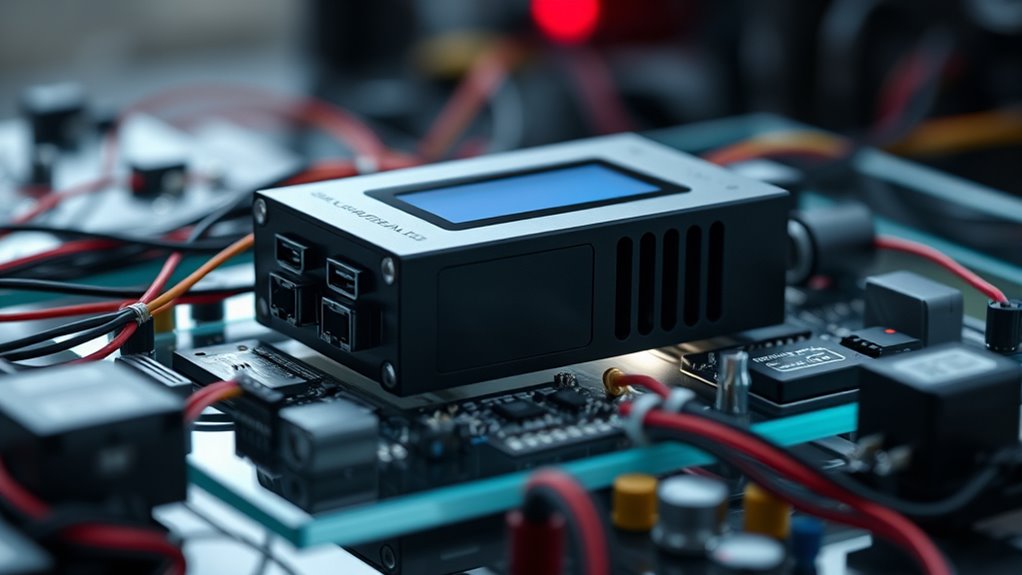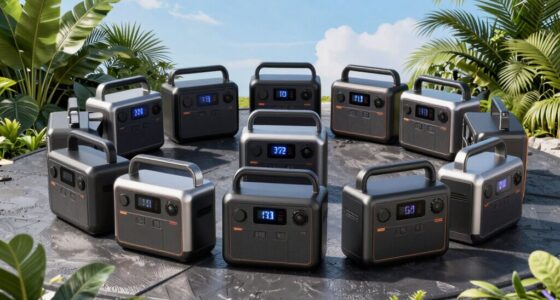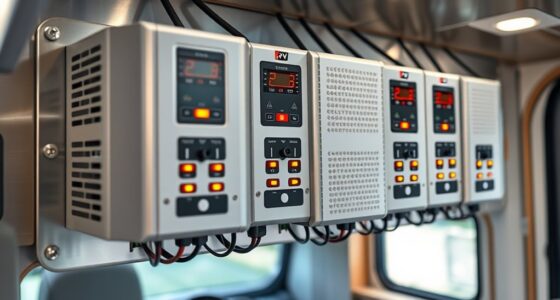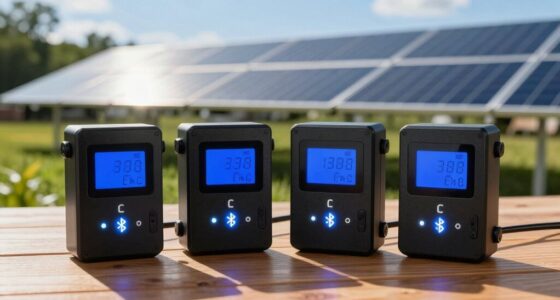If you’re searching for the best 4S lithium BMS in 2025, I recommend considering options like DALY’s smart BMS, JKBMS boards with WiFi and CAN communication, and HiLetgo’s 30A protection boards, which support various chemistries like LiFePO4 and lithium-ion. Look for features like active balancing, high current handling, and reliable protections to guarantee safety and longevity. Keep in mind the compatibility with your specific battery setup—there’s plenty more to explore for ideal choices.
Key Takeaways
- The list features top 4S lithium BMS options compatible with LiFePO4 and lithium-ion chemistries for various applications.
- Each BMS offers key protections like overcharge, overdischarge, short circuit, and temperature safeguards for reliability.
- Many models include Bluetooth or Wi-Fi connectivity for remote monitoring and easy system management.
- The selection covers different current ratings, from low-power to high-current applications up to 80A or more.
- The best choices balance performance, safety features, ease of installation, and suitability for DIY or professional projects.
JKBMS Smart BMS 4S-8S Battery Protection Board
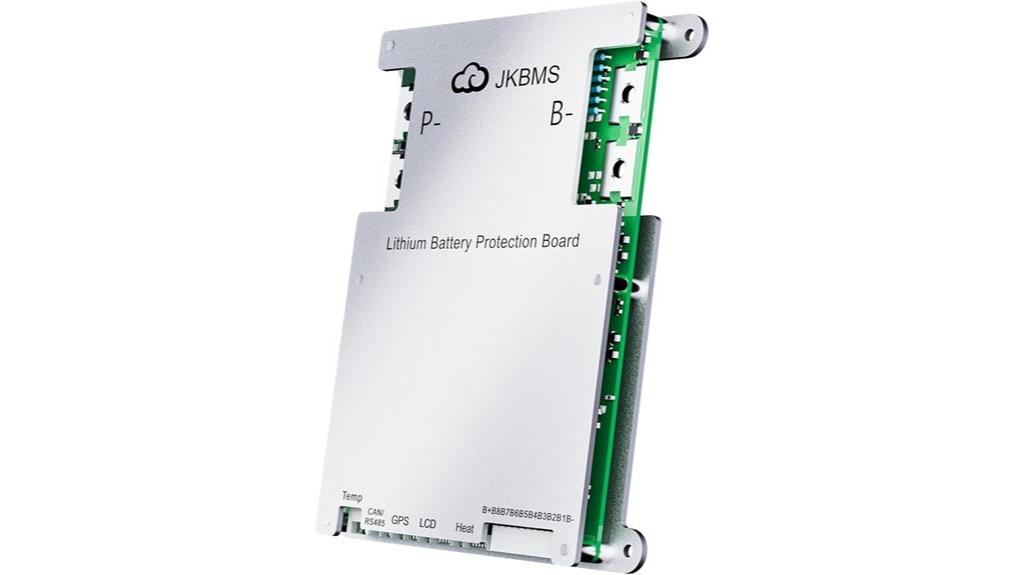
If you’re looking for a versatile and reliable BMS for your 4S or 8S lithium battery packs, the JKBMS Smart BMS 4S-8S is an excellent choice. It supports LiFePO4, Li-ion, and LTO batteries, making it suitable for RVs, solar setups, UPS systems, and custom packs. With active balance, Bluetooth, RS485, and extensive protection features, it guarantees safety and longevity. The device is easy to install, offers manual and app controls, and includes essential components like wires, screws, and a switch. Its safety features—overcharge, overdischarge, overcurrent, and temperature protection—give me confidence in its performance for various applications.
Best For: DIY enthusiasts and professionals seeking a versatile, reliable BMS solution for 4S to 8S lithium battery packs in applications like RVs, solar systems, and UPS setups.
Pros:
- Supports multiple battery chemistries including LiFePO4, Li-ion, and LTO, offering wide compatibility.
- Features active balancing and comprehensive protection (overcharge, overdischarge, overcurrent, temperature), enhancing safety and lifespan.
- Easy installation with manual and app controls, along with Bluetooth and RS485 connectivity for remote monitoring.
Cons:
- Small font on manual instructions can make setup and troubleshooting challenging.
- RS485 converter is not included, requiring an additional purchase for communication setups.
- Some users report uncertainty with heater activation and possible SOC drift, needing further calibration or monitoring.
DALY Smart BMS 4S-16S with WiFi and CAN 485 Communication
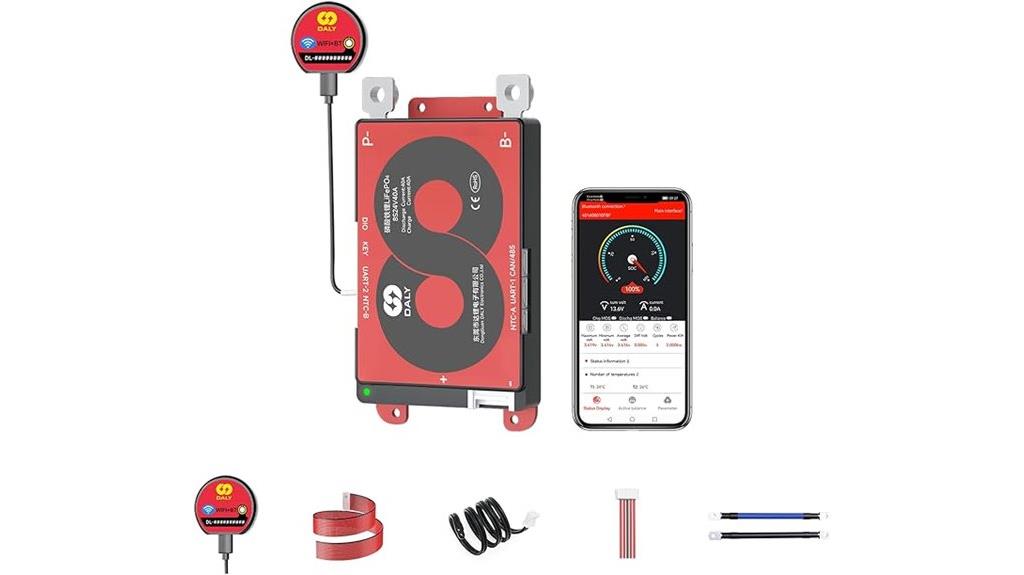
The DALY Smart BMS 4S-16S with WiFi and CAN 485 communication stands out for users seeking remote monitoring and easy integration with mainstream inverters. It supports LiFePO4 batteries, offering protection against overcharge, overdischarge, overcurrent, short circuits, and extreme temperatures. Its built-in CAN and 485 bus interfaces enable seamless connection with various inverters, while the Bluetooth/Wi-Fi dongle allows remote monitoring via mobile app or PC. Although installation is straightforward, some users report issues with inaccurate voltage readings, overheating, and app connectivity. Long-term reliability varies, with some experiencing early failures. Nonetheless, its compact design makes it suitable for home, travel, or trolling motor applications.
Best For: users seeking remote monitoring and integration of LiFePO4 battery packs with mainstream inverters for home, travel, or marine applications.
Pros:
- Supports comprehensive protection features including overcharge, overdischarge, overcurrent, short circuits, and temperature extremes.
- Built-in CAN and 485 bus interfaces facilitate seamless communication with various inverters and systems.
- Includes a Bluetooth/Wi-Fi dongle for remote monitoring and parameter adjustments via mobile app or PC.
Cons:
- Inconsistent long-term reliability, with some users experiencing early device failures.
- App connectivity issues and difficulty changing settings due to poor interface.
- Reports of inaccurate voltage readings and overheating during high current use without active cooling.
2PCS 14.4V/16.8V 5A 18650 Charger PCB BMS Protection Board for Lithium Batteries
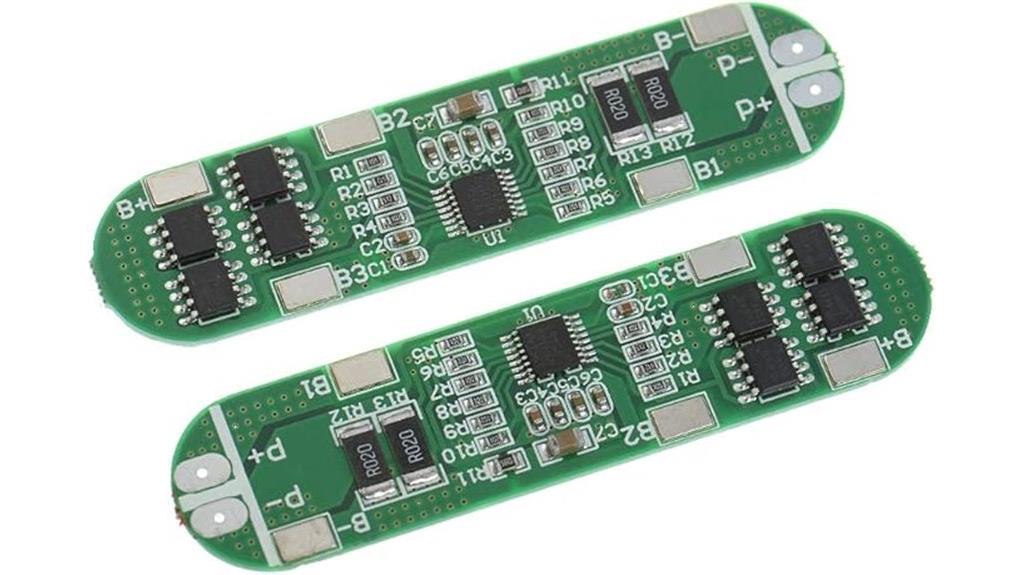
Designed for reliable protection of lithium battery packs, the PCS 14.4V/16.8V 5A Charger PCB BMS stands out with its high-accuracy voltage detection and robust safety features. It protects against overcharge (4.25-4.35V), overdischarge (2.3-3.0V), overcurrent (4-5A), and short circuits, ensuring safe operation during charging and discharging. Compact at 67mm x 16mm x 1mm, it’s suitable for 4S Li-ion and LiPo packs, supporting series and parallel configurations. With a lifespan exceeding 50,000 hours, static current below 6μA, and resistance under 45mΩ, this BMS offers reliable, precise battery management for various applications.
Best For: DIY enthusiasts and professionals seeking reliable, high-precision protection for lithium battery packs in various electronic projects and energy storage solutions.
Pros:
- High-accuracy voltage detection ensures precise overcharge and overdischarge protection.
- Compact size (67mm x 16mm x 1mm) allows easy integration into various device configurations.
- Supports series and parallel connections for customizable voltage and capacity setups.
Cons:
- Variability in manufacturing quality can lead to units that fail or malfunction.
- Some users report difficulty in initial activation or powering up the device without external assistance.
- Internal MOSFET diode limitations may restrict handling capacity, requiring additional components for high current applications.
2pcs 4S Li-ion Lithium Battery 18650 Charger PCB BMS Protection Board
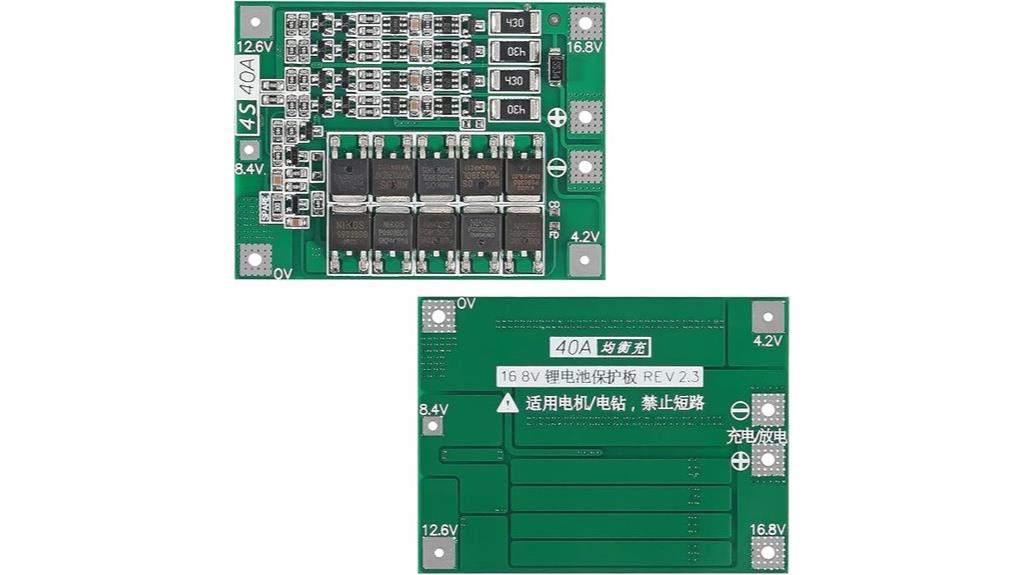
This 4S Li-ion Lithium Battery 18650 Charger PCB BMS Protection Board stands out as an ideal choice for DIY enthusiasts building small to medium-sized battery packs. It features a compact, lightweight design with durable workmanship and high-accuracy voltage detection, ensuring stable performance. The board provides multiple protections, including over-discharge, overcurrent, and overcharge safeguards, supporting high charge/discharge currents suitable for lithium batteries like 18650, 26650, and polymer types. Capable of powering tools up to 80A and 135W, it’s perfect for building reliable battery packs. While some users report balancing and protection issues, proper wiring and potential modifications can enhance its safety and functionality.
Best For: DIY enthusiasts and hobbyists building small to medium-sized lithium battery packs requiring reliable protection and balanced charging.
Pros:
- Compact and lightweight design with durable workmanship for easy integration.
- Supports high charge/discharge currents up to 80A and 135W, suitable for powering tools and devices.
- Provides multiple protections including over-discharge, overcurrent, and overcharge safeguards, enhancing safety.
Cons:
- Balancing performance may be limited, requiring external modifications for optimal cell management.
- Potential overvoltage push and lack of effective over-discharge cutoff can pose safety concerns.
- Some units may arrive DOA or require troubleshooting to function correctly, affecting reliability.
HiLetgo 14.8V 4S 30A Li-ion Battery BMS PCB
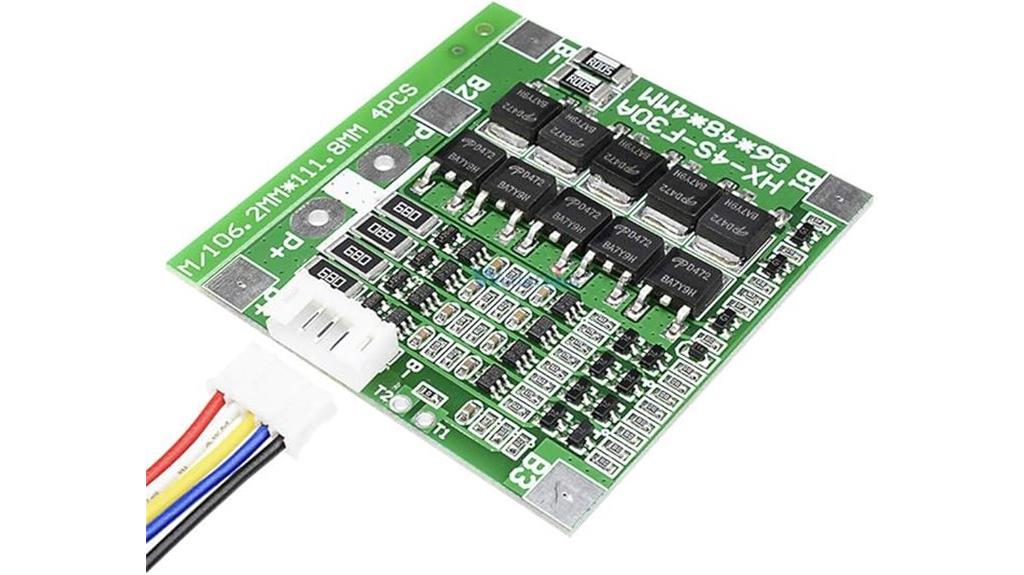
If you’re looking for a reliable BMS that offers precise overcharge, overdischarge protection, and cell balancing for 4S lithium-ion packs, HiLetgo’s 14.8V 4S 30A Li-ion Battery BMS PCB is an excellent choice. It features high-accuracy voltage detection, a durable build, and integrated circuits to guarantee safety. With a 30A working current and 60mA balancing current, it handles typical loads well. The board safeguards against overcurrent, short circuits, and temperature extremes from -20°C to +80°C. Its compact size (56×48×4mm) makes it versatile, and proper wiring is vital for peak performance and safety.
Best For: DIY enthusiasts and professionals seeking a reliable, high-current BMS for 4S lithium-ion battery packs with precise protection and balancing features.
Pros:
- High-accuracy voltage detection and comprehensive protection features ensuring safety.
- Compact size (56×48×4mm) suitable for various applications and easy integration.
- Durable build with integrated circuits and a 30A working current handle typical loads effectively.
Cons:
- Proper wiring and setup are critical; incorrect installation can cause hazards or malfunction.
- Some users report initial low voltage output until properly powered, which may be confusing for beginners.
- Documentation and wiring instructions may lack clarity, requiring careful reading and understanding before use.
4PCS 16.8V Lithium Battery Protection Board (BMS) for 18650 Cells
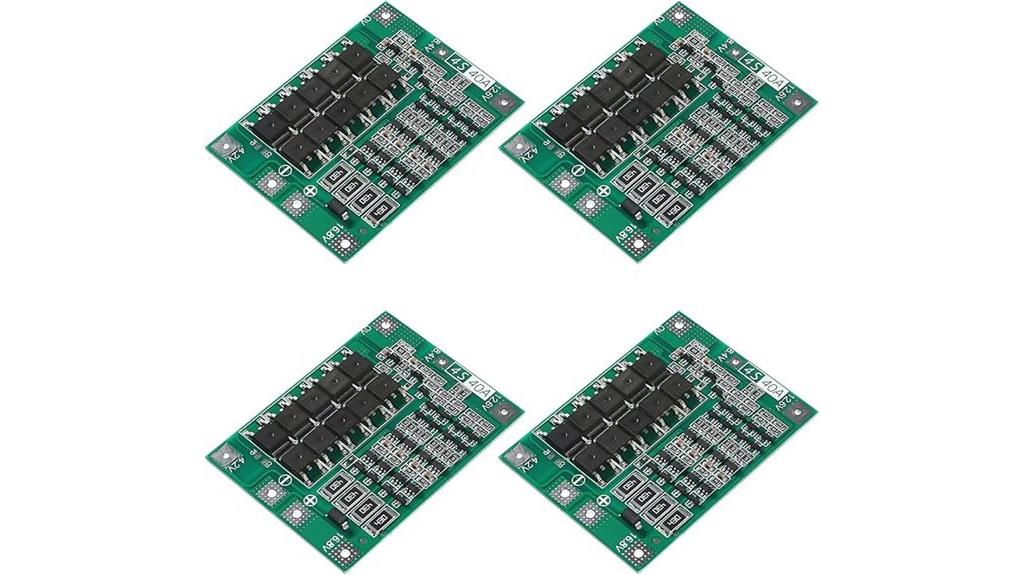
The PCS 16.8V Lithium Battery Protection Board (BMS) for 18650 cells stands out as an ideal choice for DIY enthusiasts and professionals seeking a reliable, high-current protection solution for 4S lithium battery packs. It supports 18650, 26650, and polymer lithium cells, with a maximum continuous current of 40A and charging up to 20A. This compact board measures 45x60mm and offers essential protections like overcharge, overdischarge, overcurrent, and short circuit. It includes balance charging to keep each cell within safe voltage limits, making it perfect for powering tools, motors, and custom battery projects with safety and efficiency.
Best For: DIY enthusiasts and professionals needing a reliable high-current protection solution for 4S lithium battery packs in power tools, motors, and custom battery projects.
Pros:
- Supports multiple lithium cell types (18650, 26650, polymer) with high continuous current up to 40A
- Provides comprehensive protections including overcharge, overdischarge, overcurrent, and short circuit
- Compact size (45x60mm) with balance charging functionality for safe and efficient operation
Cons:
- Lacks a connector for balance leads, making wiring less convenient
- Cannot easily adjust charge/discharge current or voltage limits without modifications
- Some units may arrive DOA or experience issues with charging and balancing if not wired correctly
2 Pack 12V 100Ah LiFePO4 Batteries
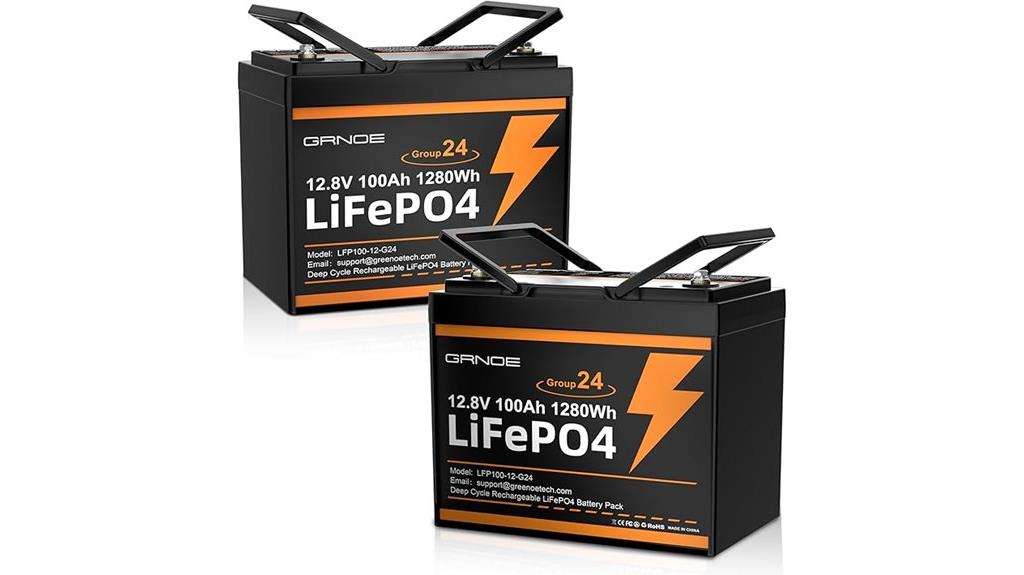
Pack 12V 100Ah LiFePO4 batteries stand out for their high energy density and lightweight design, making them ideal for portable, off-grid, and backup power applications. Weighing just 21.9 pounds each, they’re 50% lighter than lead-acid options, yet offer up to 15,000 cycles at 60% DOD—providing over 10 years of reliable, maintenance-free use. These batteries are expandable to 51.2V 400Ah, perfect for larger setups. Equipped with a smart BMS for protection and certified safe by multiple standards, they’re versatile for solar, RV, marine, or emergency backup systems. Installation is straightforward, and their durability suits tough environments.
Best For: DIY enthusiasts, off-grid adventurers, and backup power users seeking reliable, lightweight, and expandable battery solutions.
Pros:
- Extremely lightweight at 21.9 lbs per battery, making installation and transportation easier
- Long lifespan with up to 15,000 cycles at 60% DOD, ensuring over a decade of dependable use
- Safe, certified by multiple standards, and equipped with smart BMS for comprehensive protection
Cons:
- Not suitable for engine starting or high-current surges due to design limitations
- Requires a specific 14.6V LiFePO4 charger for initial activation, which may not be included
- Avoid water submersion and overloading to prevent damage and ensure longevity
4PCS Lithium Battery BMS PCM Protection PCB Board Module for 18650 16.8V
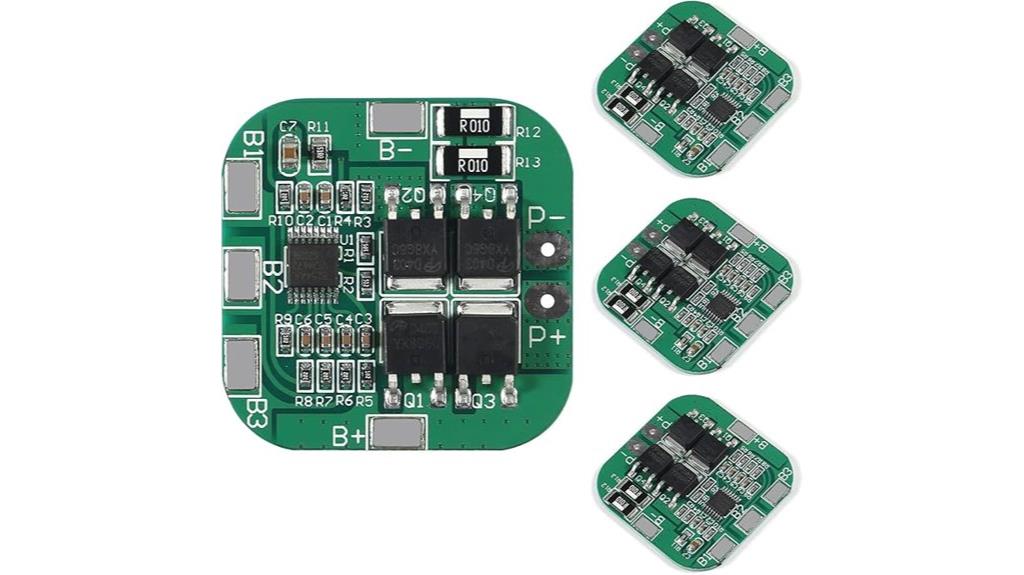
For those building 18650 battery packs requiring reliable protection at 16.8V, the PCS Lithium Battery BMS PCM Protection PCB Board Module stands out as an excellent choice. This set includes four protection boards designed specifically for 4S configurations, supporting up to 20A discharge current. It features high-accuracy voltage detection, over-current, overcharge, and overdischarge protection, ensuring safety during operation. The compact PCB fits neatly on top of four 18650 cells, making it ideal for custom or commercial battery packs. With simple wiring and reliable MOSFET control, it’s a dependable option for applications like low-power inverters, solar lights, and backup power systems.
Best For: DIY enthusiasts, hobbyists, and professionals building custom 18650 battery packs requiring reliable overcharge, overdischarge, and short circuit protection at 16.8V and up to 20A discharge current.
Pros:
- High-accuracy voltage detection with reliable overcharge and overdischarge protection
- Compact design that fits neatly on top of four 18650 cells for easy integration
- Supports high discharge currents up to 20A, suitable for various low-power applications
Cons:
- Limited detailed information on maximum continuous current and safety margins
- Slightly higher price point compared to basic protection circuits without additional features
- Product documentation and user support could be more comprehensive for novice users
6pcs Lithium Battery Protection Circuit Boards (BMS) for 18650 Cells

If you’re building a 4S lithium battery pack with 18650 cells, these protection circuit boards provide a reliable way to safeguard your batteries from over-discharge, overcurrent, and overcharge. The 6-piece enhanced 4S 40A BMS supports applications like power tools below 170W, with a charging voltage of 16.8-17V and a max discharge current of 40A. It features high-accuracy voltage detection, low standby current, and compact design. Proper wiring and balancing are essential, especially in series configurations. While affordable and easy to install, cautious handling is vital, as misuse or incorrect wiring can lead to failures and cell damage.
Best For: DIY enthusiasts and hobbyists building 4S lithium battery packs for power tools, solar projects, or experiments who need reliable protection and straightforward installation.
Pros:
- Provides comprehensive over-discharge, overcurrent, and overcharge protection for 18650 batteries
- Compact, lightweight design with high-accuracy voltage detection and low standby current
- Affordable and easy to install, suitable for various series battery configurations
Cons:
- Lacks built-in short circuit protection, requiring careful wiring and additional safety measures
- Some users report reliability issues and potential failures within days if mishandled or improperly connected
- Requires proper heat dissipation during high-current use to prevent overheating and damage
3pcs Type C Lithium Battery Charger Board for 2S 3S 4S Batteries
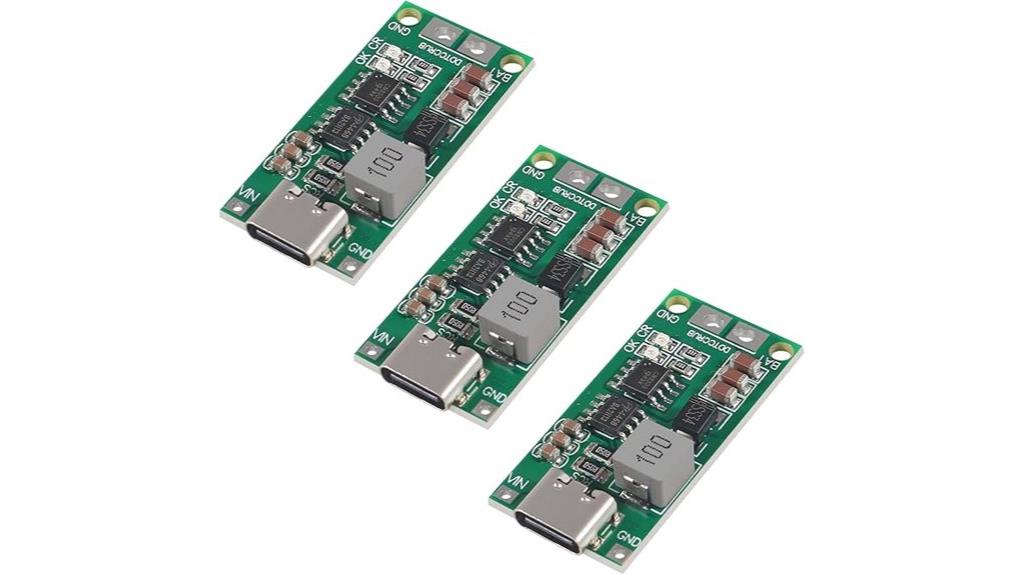
The pcs Type C Lithium Battery Charger Board is an excellent choice for hobbyists and DIY enthusiasts working on small-scale projects involving 2S, 3S, or 4S lithium-ion batteries. These compact, multi-cell boost modules convert low voltage input into appropriate charging voltages, with adjustable currents up to 4A. They feature overvoltage protection, LED indicators, and operate within a wide temperature range. However, higher current models tend to overheat and require careful wiring and testing. Designed for simple 5V USB power sources, they’re best suited for controlled, low-current charging tasks rather than continuous high-power use. Proper handling guarantees safe, reliable charging for your series-connected lithium cells.
Best For: hobbyists and DIY enthusiasts needing compact, adjustable lithium battery charging modules for small-scale 2S, 3S, or 4S projects.
Pros:
- Compact size and lightweight, ideal for space-constrained applications
- Adjustable charging current up to 4A for versatile charging needs
- Includes overvoltage protection and LED indicators for safety and status monitoring
Cons:
- Higher current models (4A) tend to overheat and may require active cooling
- Slow charging times, especially for larger battery packs, and limited to 5V USB power sources
- Potential issues with false LED indicators and inconsistent performance, requiring careful wiring and testing
2Pack Li-ion Battery Protection Board for 4S 40A Batteries

When selecting a protection board for 4S 40A lithium batteries, this model stands out for its compact design and high-accuracy voltage detection, making it ideal for users who need reliable protection without adding bulk to their packs. It’s lightweight, durable, and supports multiple protections like over-discharge, overcurrent, and overcharge. While it’s designed for high-current applications, some users report it struggles beyond 5A, with risks of damage during short bursts. It’s best suited for low to moderate current uses, such as small electric vehicles or portable power packs, where precise cell balancing and reliable safety features are essential.
Best For: users seeking a compact, lightweight protection board for 4S lithium battery packs with moderate current demands, such as portable power sources or small electric devices.
Pros:
- High-accuracy voltage detection for reliable cell monitoring
- Multiple protection features including over-discharge, overcurrent, and overcharge safeguards
- Compact and lightweight design suitable for space-constrained applications
Cons:
- May struggle to handle currents exceeding 5A, risking damage during short bursts
- Reports of inconsistent protection performance and potential malfunction in overcharge or balancing
- Not suitable for high-current applications like power tools or electric drills beyond 80A starting current
3S 4S 12V 5A Battery Active Equalizer BMS Balancer
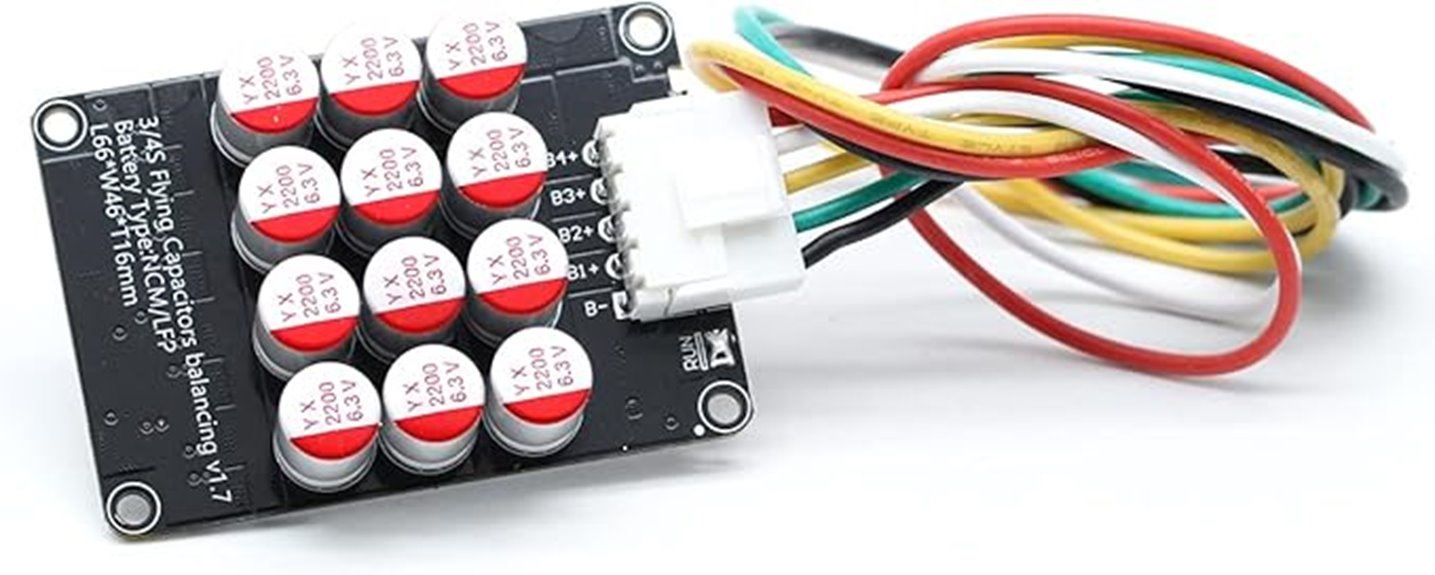
For anyone managing high-capacity 4S lithium battery packs, the S 4S 12V 5A Battery Active Equalizer BMS Balancer stands out due to its active balancing capabilities and precise voltage regulation. It effectively balances large packs, maintaining cell voltages within ±5mV and transferring up to 2A for faster, more reliable balancing. Its ultra-low internal resistance MOS and flying capacitor transfer ensure efficient energy transfer with minimal heat. Easy to install and operate, it works with Li-ion and LiFePO4 batteries, making it ideal for applications like ebikes, solar setups, or custom battery packs. Just remember to verify wiring and avoid over-discharging for long-term safety.
Best For: DIY enthusiasts and professionals managing high-capacity 4S lithium battery packs requiring efficient active balancing and precise voltage regulation.
Pros:
- Effectively balances large battery packs with cell voltage precision within ±5mV.
- Transfers up to 2A for faster, more reliable energy balancing.
- Easy to install and compatible with Li-ion and LiFePO4 batteries.
Cons:
- Not suitable for LTO batteries.
- Aggressive balancing can cause damage if batteries are severely unbalanced or damaged.
- Requires careful wiring and monitoring to prevent overcurrent or capacitor explosions.
LiFePo4 12V 800A Max BMS Lithium Battery Protection Board

If you’re seeking a reliable protection board for high-capacity LiFePo4 batteries, the LiFePo4 12V 800A Max BMS is an excellent choice. It’s designed for 3.2V LiFePo4 cells, offering overcharge, over-discharge, and short circuit protections. With a continuous current of 50A and an instantaneous peak of 800A, it handles demanding applications like emergency car starts and power tools. Compact at 63x90x9mm and weighing just 85g, it’s easy to integrate into various systems. Its balanced charging and safety features ensure longevity and reliable performance, making it a top pick for high-capacity battery management in 2025.
Best For: DIY enthusiasts, electricians, and hobbyists seeking a reliable, high-capacity protection board for LiFePo4 batteries used in emergency starting, power tools, and electric vehicles.
Pros:
- Provides comprehensive overcharge, over-discharge, and short circuit protection to ensure battery safety and longevity
- Handles high peak currents up to 800A, suitable for demanding applications like car starts and power tools
- Compact and lightweight design makes it easy to integrate into various battery systems
Cons:
- Limited continuous current of 50A may require multiple units for larger capacity setups
- Only suitable for 3.2V LiFePo4 cells, limiting its use with other battery chemistries
- May require technical knowledge for proper installation and integration into custom systems
Li-ion/Lipo/Lifepo4 Lithium Battery Active Equalizer Balancer BMS
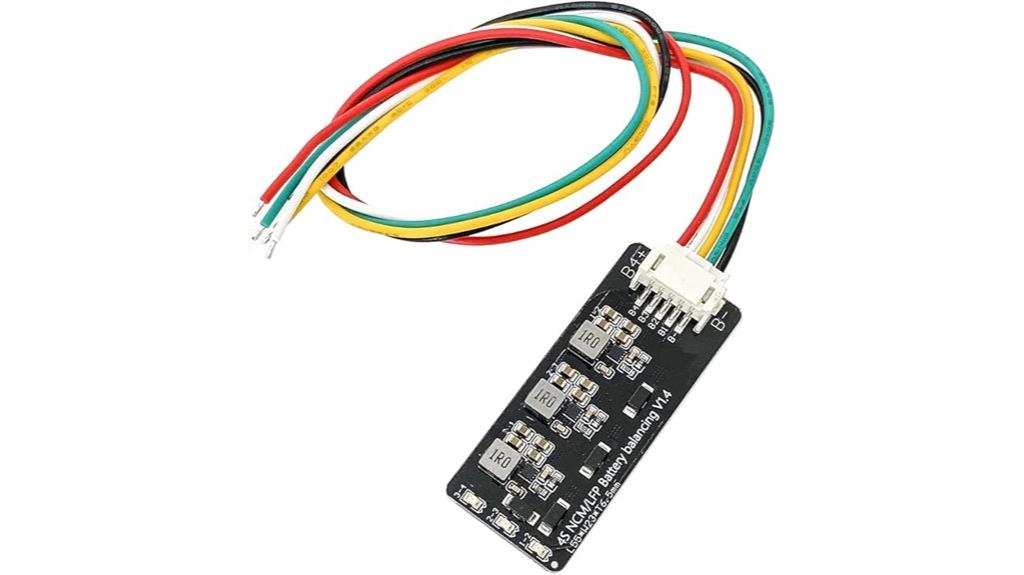
The Li-ion/Lipo/Lifepo4 Lithium Battery Active Equalizer Balancer BMS stands out as a practical solution for maintaining balanced 4S lithium battery packs, especially when precise voltage regulation is essential. This model from XFYBZN supports lithium-ion and LFP batteries, balancing cells within 2.0V-4.5V, though it’s not optimized for Lifepo4. It detects voltage differences over 0.1V and balances with currents up to 1.2A. While effective for well-balanced packs, it may struggle with highly unbalanced ones. Proper wiring and understanding its limitations are vital, especially since it’s not suitable for low string counts or large capacity packs.
Best For: hobbyists and DIY enthusiasts who need an affordable, easy-to-implement balancing solution for well-maintained 4S lithium-ion or LFP battery packs, but not suitable for highly unbalanced or large capacity batteries.
Pros:
- Supports multiple lithium battery types including Li-ion, Lipo, and Lifepo4 (LFP) within specified voltage ranges
- Simple balance detection triggered at voltage differences over 0.1V with a balance current up to 1.2A
- Compact size and long sense wires facilitate easy installation and connection
Cons:
- Not optimized for highly unbalanced packs or large capacity batteries over 30AH
- May not trigger balancing on packs with significant voltage disparities or low string counts
- Lacks detailed instructions and indicator explanations, requiring users to understand its limitations and proper wiring
Factors to Consider When Choosing 4s Lithium BMS
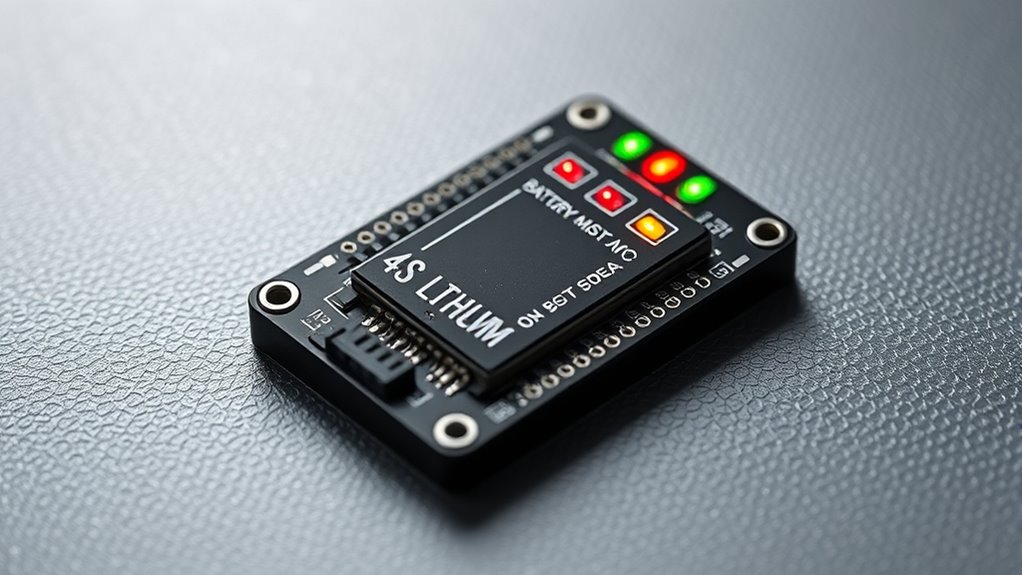
When selecting a 4S lithium BMS, I consider compatibility with my battery type and the necessary current and voltage limits to make certain of safe operation. I also look at balancing and protection features, along with how easy it is to install and monitor the system. These factors help me choose a BMS that fits my needs and keeps my battery pack reliable.
Compatibility With Battery Types
Choosing the right 4S lithium BMS requires paying close attention to its compatibility with your battery chemistry. Not all BMS units support every type, so it’s essential to verify it explicitly states support for your chemistry, whether LiFePO4, Li-ion, or LTO. This ensures proper protection and balancing, which are tailored to each chemistry’s characteristics. Additionally, check that the BMS’s voltage and current ratings match your pack’s specifications to avoid issues like overvoltage or undervoltage. Some models are designed specifically for series configurations, like 4S, while others might only support parallel setups. Confirm the BMS’s compatibility with your battery type to ensure reliable performance and longevity. Selecting a model tailored to your chemistry guarantees maximum safety and efficiency.
Current and Voltage Limits
Making certain that your 4S lithium BMS can handle your application’s current and voltage demands is essential for reliable performance. First, check that the BMS’s maximum continuous discharge current meets or exceeds your peak load, such as 40A or higher for power tools. This prevents overheating and guarantees consistent power delivery. Next, verify the voltage rating supports your pack configuration—typically 16.8V for a 4S setup. Overcurrent protection thresholds should be set appropriately to avoid damage during high load situations. Additionally, confirm the BMS’s short circuit and surge protection capabilities align with your safety needs. Some BMS units support peak currents up to 800A for brief periods, which is useful for emergency starts, but their continuous current ratings are usually lower.
Balancing and Protection Features
Effective balancing and protection features are essential for maintaining the health and safety of your 4S lithium battery pack. I look for BMS units with active balancing, which can reclaim up to 20% capacity and keep cell voltages within a few millivolts, ensuring longevity. Overcharge protection (around 4.2V per cell) and overdischarge limits (about 2.5V) are necessary to prevent damage. High current safeguards, supporting continuous discharges of 40A or more, protect against overloads and shorts. Temperature monitoring is critical, with cutoff points to prevent thermal runaway. Proper balancing reduces capacity fade and extends battery life. Overall, reliable protection features are fundamental for safe, efficient, and long-lasting battery performance.
Ease of Installation
When selecting a 4S lithium BMS, ease of installation can save you time and reduce errors. Look for models with clearly labeled wiring terminals to prevent incorrect connections, which can be a common pitfall. A detailed, easy-to-understand manual, especially with diagrams or visual aids, makes setup smoother and helps avoid mistakes. Opt for BMS units with plug-and-play connectors or pre-wired cables to minimize the need for soldering or custom wiring, saving you effort and potential wiring mishaps. Choose a BMS that supports straightforward activation, like automatic power-up or simple switches, to speed up initial setup. Additionally, a compact design with minimal wiring complexity helps streamline installation, especially in tight spaces or DIY projects.
Communication and Monitoring Options
Choosing the right communication and monitoring options for your 4S lithium BMS is crucial for maintaining ideal battery performance and safety. Bluetooth is great for quick, local updates via smartphone apps, but its range is limited to about 10 meters. Wi-Fi modules enable remote monitoring from anywhere, making them suitable for continuous oversight. For industrial or complex setups, RS485 and CAN bus interfaces offer dependable data transmission over longer distances, allowing integration with inverters and systems. The communication method you select impacts how easily you can access real-time data, the accuracy of information, and the complexity of setup and maintenance. Think about your monitoring needs, setup environment, and desired remote capabilities to choose the best option that guarantees safety and optimal performance.
Frequently Asked Questions
How Do I Troubleshoot a Malfunctioning 4S Lithium BMS?
When troubleshooting a malfunctioning 4S lithium BMS, I start by checking all connections for loose wires or corrosion. I then verify the voltage levels across each cell and confirm they’re within normal ranges. If the BMS shows error codes, I consult the manual for specific diagnostics. Resetting the system or updating firmware can also help. If issues persist, replacing faulty components or the entire unit might be necessary.
What Are the Best Practices for Maintaining BMS Longevity?
To keep my BMS lasting longer, I make sure to regularly check connections for corrosion or looseness. I keep the battery charged within recommended levels and avoid deep discharges. I also guarantee the environment is cool and dry, preventing overheating. Periodic software updates and monitoring voltage and temperature help catch issues early. Proper maintenance is key to extending my BMS’s lifespan and ensuring reliable performance.
Can BMS Units Be Upgraded or Customized Post-Purchase?
Did you know that over 60% of BMS failures are due to improper customization or upgrades? Yes, BMS units can often be upgraded or customized after purchase, but it’s tricky. I recommend consulting the manufacturer first, as unauthorized modifications can void warranties or cause safety issues. If done correctly, some firmware updates or hardware tweaks can enhance performance, just be sure to follow proper procedures and safety guidelines.
How Does BMS Impact Overall Battery Lifespan?
A BMS greatly impacts my battery’s lifespan by monitoring and managing charging, discharging, and temperature levels. It prevents overcharging and deep discharges, which can damage cells over time. By ensuring ideal conditions, my BMS helps extend the battery’s life and maintain performance. Without a reliable BMS, my battery could degrade faster, losing capacity sooner. So, a good BMS is essential for maximizing longevity and safety of my lithium battery.
Are There Compatibility Concerns With Different Lithium Battery Chemistries?
Did you know that using an incompatible BMS can reduce battery life by up to 30%? I’ve learned that compatibility concerns are real; different lithium chemistries like Li-ion, LiFePO4, and others require specific BMS settings. I always double-check the BMS specs before pairing, ensuring it matches the battery chemistry. This helps avoid safety issues and maximizes performance, giving me peace of mind and longer-lasting batteries.
Conclusion
When choosing the best 4s lithium BMS, consider reliability, features, and communication options. Prioritize protection, balance, and ease of use. Look for smart features, expandability, and compatibility with your batteries. Evaluate your needs, compare top options, and make an informed decision. With the right BMS, you guarantee safety, extend battery life, and optimize performance. Trust your choice, stay confident, and power your projects with a dependable, efficient BMS that meets your expectations.

